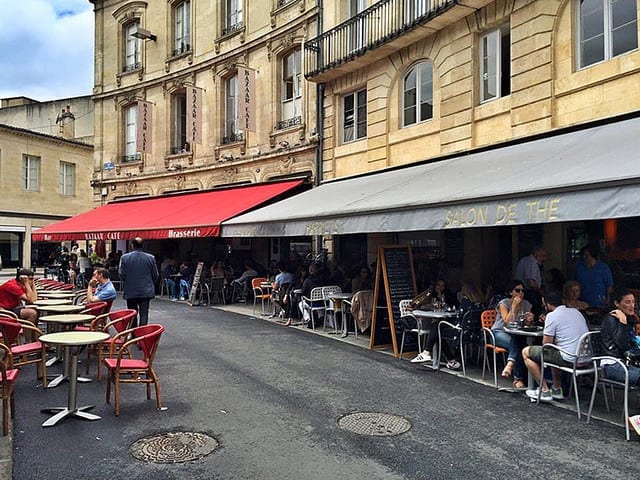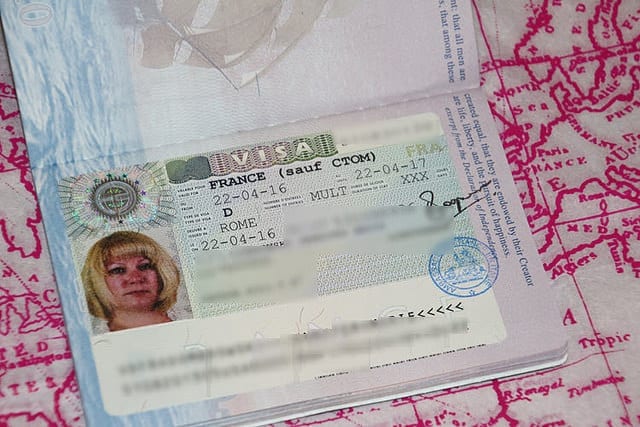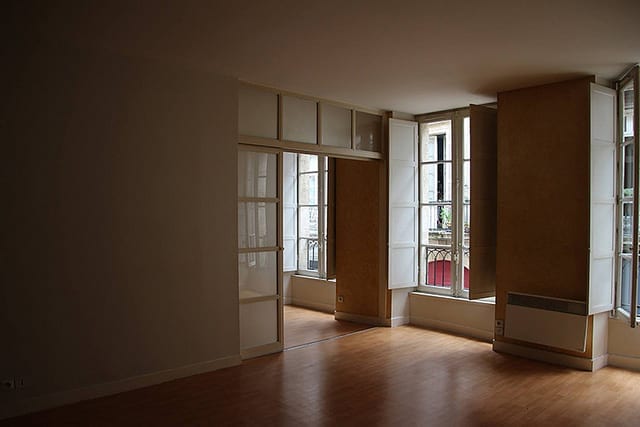“You’re living the dream!”
“You’re so lucky!”
“I’ve always wanted to sip café, sit on terraces and indulge in decadent desserts all day!”

These are the things people wistfully say with a far off look in their eyes when you tell them you’re moving to France. I, too, pictured exactly that on my first trip to France – sitting on a terrace outside a charming café, in an impossibly chic outfit of course, while sipping some of the world’s best wines and eating macarons until the button on my French designer pants popped.
Not to burst any bubbles, but moving to France as an American is hard. If I’m being completely honest, I cried a lot during the whole process from the stress of trying to navigate the French bureaucracy that seemingly creates an endless circle of catch-22s. And I nearly gave up on the whole idea. More than once.
A lot of the stress could have been avoided if I’d known what to expect and how to plan for the timing of it all. So, you’re thinking of moving to France as an American? While the process varies some for individual situations, I’m sitting here sharing my sage advice from my apartment in Bordeaux.
Contents
Getting a French Visa
 Americans who wish to stay in France for longer than the 90 days our American passports allow us to will need to apply for a visa. There are a variety of types of visas you can apply for, so be sure to review each type of visa carefully to decide which you best qualify for.
Americans who wish to stay in France for longer than the 90 days our American passports allow us to will need to apply for a visa. There are a variety of types of visas you can apply for, so be sure to review each type of visa carefully to decide which you best qualify for.
First, start by visiting the Embassy of France website. Based upon your state of residence, you pick the French Consulate assigned to your state. This is where you’ll book an appointment and appear for your interview (in person), which will decide your French fate.
You book your appointment and print out the forms you’ll need to appear with.
Sounds simple, right?
Wrong.
The first thing you’ll learn about moving to France as an American is that the French love to tell you “it’s not possible.” You’ll hear that phrase so often you’ll feel like its been beaten into you with a bat.
I personally think this is like a test. How much do you really want to live in France and how much are you willing to endure to make that happen? If can push through the not possibles like pushing through that point of sheer exhaustion when running a marathon, you’ll definitely cross the finish line.
Preparing for Your Visa Appointment
As I discovered, each French Consulate has slightly different variations of the documents you’ll need to gather in preparation for your visa appointment. I ensured that I had every single item on my checklist, but I also consulted all the other consulates’ checklists and was over-prepared with extra documentation.
Since I’m not a student, too old (by French standards) to be an au pair and I was not being sponsored by a company in order to apply for a work visa, I opted for a long stay visa. This visa allows me to live in France, but not to work in France for French companies. As a professional travel blogger, I can still earn income just not from a French company located in France.
Essentially, what you’ll need to apply for a France long stay visa is:
- 2 original copies of the long stay visa form completed
- 2 passport photos
- passport and a copy (note that your passport must be valid for 3 months beyond the end date of your intended stay in France)
- proof of residence in the consulate jurisdiction you booked your appointment with
- OFII form
- letter stating your purpose in France
- proof of means of income (expect to need to prove you have a minimum income of €2500 per month and 12 months worth of rent in savings)
- proof of medical insurance
- letter promising not to engage in employment in France
- a deed or contract for your accommodations in France for the duration of your stay (welcome to your first catch-22!)
I wrote in detail about each of these requirements here.
Appearing for the Visa Appointment

You must appear in person for your visa appointment. It takes one hour and you’ll go through each document one by one. I highly recommend that you have the documents placed in the order as they appear on the consulate’s website.
Be prepared to answer questions about your profession, how you earn money, your financial wellbeing and what you intend to do in France during your stay.
While you won’t be told the decision at the visa appointment, you’ll have a gut feeling about how it went. I just knew when I left my appointment that I’d be awarded my visa.
It can take up to two weeks to receive a decision. If you don’t live in the city where the consulate is located, you’ll have to leave your passport along with a self-addressed and prepaid Express mail envelope.
Getting a French Bank Account
Once you’re awarded your French visa, it’s time to get your butt to France as quickly as possible and start the process of opening a French bank account. DO NOT WAIT.
As a former banker for JPMorgan Chase, I really thought this was no big deal. And so I waited to combine an apartment-hunting trip with taking care of things like opening my French bank account when it came to me moving to France. What a huge mistake!
Opening a bank account in France is more like the equivalent of buying a house in the US, only there’s more paperwork. No, seriously.
First, forget about just walking into a bank and opening an account. You’ll need an appointment. Better yet if you know someone in France and they refer you for the appointment as their financial wellbeing carries weight in whether you will be approved for your bank account.
You’ll meet with the individual who will be your personal banker and handle all of your banking needs. Bring everything you brought to your visa appointment, plus a copy of your latest tax return, your new French visa and a utility bill. And be prepared to develop carpal tunnel from signing your life away.
But, wait! You haven’t moved to France so how do you get the utility bill? Welcome to your next catch-22 of this process.
I suggest you set up something like a cell phone and list your hotel’s or friend’s address. You’ll receive a paper receipt with this information and it will suffice as your utility bill. I simply got a pay-as-you-go SIM from Orange and listed my hotel as my address.
There is now the Foreign Account Tax Compliance Act regarding Americans having bank accounts outside their home country. Basically, the banking institution has to notify the IRS about your financial records. I won’t pretend to entirely understand this law, just know that it means opening a bank account as an American in France is a pain in the ass.
Don’t expect to walk out with a temporary card and an account when you leave your appointment. All of your information must be reviewed by the bank’s home office, which is likely located in Paris, and it takes about 14 business days to receive a decision.
They can ultimately decide to not open the account for you. If that happens, the bank is required to provide you with a lettre de refus. You can take this letter to the local Banque de France office and fill out a form requesting a bank account. Banque de France mails you a letter designating a bank that is required by law to open an account for you, and you take that letter and all the documents I mentioned above to the assigned bank to open your account.
And viola! Congratulations, you now have a French bank account.
Getting an Apartment in France

Forget about apartment hunting until you have both the visa and the French bank account. It’s truly not possible to sign a lease without both the visa and the French bank account.
Apartment hunting is difficult and best accomplished in person. There are a few websites like Seloger where you can start your search, but ultimately it’s best to decide the neighborhood that you want to live in and make appointments with agencies in that neighborhood.
I just went around to any location immobilier (real estate agency) that listed louer (rentals) and gave my requirements. Know in advance what your monthly budget is, the minimum square meters you require and whether you want a furnished or unfurnished place.
When making your appointment, fully state your situation in France. This can save you a lot of time. Like with the bank, there are a whole slew of laws that protect the property owners in France from bad tenants. The insurance that owners often take out to prohibit non-payment works against anyone without a French job contract.
You see, in France if you’re being a bad tenant or not paying, it can be a difficult and long process to evict you. This is totally the opposite of the US, where not paying would get you evicted within 1-2 months and have a negative impact on your credit. In France, the landlord or management agency can ask your employer to put pressure on you.
Even though the French tenant could lose their job at any time, they are the more ideal tenant in the eyes of the law and insurance companies.
Moving to France as an American almost definitely will require you to obtain what is a called a bank guarantee. Basically, the bank co-signs as your guarantee to pay your rent in the event you don’t. Of course, the bank also wants to protect themselves so you must fund a line of credit to obtain this bank guarantee.
Essentially, I needed €11,000 cash to fund my bank guarantee for a year lease on my apartment that costs €890 per month. That’s in addition to proving I either had at least another €30,000 in savings or will make that amount as income in order to live in France for one year.
The bank guarantee takes around 30 days for approval and to be processed, so plan accordingly for your move in date. It’s also good to know that you must have a lease in order to process the bank guarantee as it’s tied to a specific beneficiary.
Moving To France as an American- A Timeline
As you see, it takes a lot of planning and work to get to the point where you’re enjoying a café on a terrace. In the eyes of so many, I’m “living the dream” but that’s only because I made my dream a reality. If it’s your dream too, I suggest following this timeline for moving to France to help make the process a more sane one.

Jennifer Dombrowski is a location independent globe trotter who is now based in Bordeaux, France after living in Italy for seven years. She works as a freelance social media strategist and is an award-winning travel writer. She is also a travel correspondent on Traveling on the American Forces Radio Network. Luxe Adventure Traveler was named one of the top travel blogs to watch by the Huffington Post and has been featured by top publications such as National Geographic, CNN, Buzzfeed , and The Telegraph. Follow Jennifer on Luxe Adventure Traveler, Facebook and Instagram.
Thinking about taking the plunge into expat life? Find out more what it is like:
Preparing to Move Abroad – Part One
Preparing to Move Abroad – Part Two
What I Didn’t Expect as an Expat
The Process of Getting Italian Citizenship

